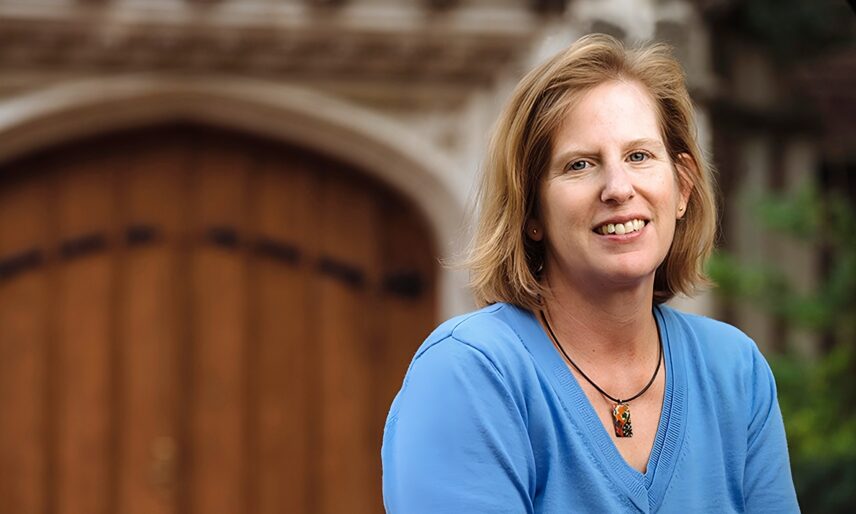Article begins
1965–2023
Carolyn Kornfeld Lesorogol, 58, professor at the Brown School at Washington University, passed away on May 17, 2023. Her persistent, heroic resistance to cancer’s claim on her was awe-inspiring. She completed a book in her final year, continued meeting collaborative commitments and reading doctoral theses in her final weeks, and, in her final days, was still engaging in her exercise routine and exchanging lomon (personal “news”) with family and friends.
While an undergraduate at Harvard University, from which she received a BA in social studies in 1987, graduating magna cum laude, Carolyn spent a semester abroad in Kenya in 1986. Her experience in Samburu County was transformative personally and professionally. She returned to Samburu to marry Leretin Lesorogol, and, after teaching high school in the county seat of Maralal for a few years, she returned to the United States to undertake her MA in African studies at the University of California, Los Angeles, which she completed in 1991. Her MA thesis, “Pastoral Production and Transformations Among the Samburu of Northern Kenya,” examined the colonial and postcolonial policies that compromised Samburu subsistence livelihoods through restrictions on land use and forced reductions of livestock holdings.
After completing her master’s degree, Carolyn initiated a career in participatory rural development. She led projects in Samburu County funded by the German Agency for Technical Cooperation and worked on projects funded by USAID and the World Bank. She maintained a passionate, lifelong commitment to partnering with Samburu communities to design and implement sustainable and culturally meaningful projects that would improve pastoralist lives and well-being. Her language skills in Kiswahili and Samburu were essential to the ease with which Carolyn engaged in these projects and her scholarly work. She believed that direct communication with one’s research partners was essential to both rapport and to understanding life as it unfolded beyond the frame of one’s research questions.
In 1998, Carolyn returned to the United States to pursue a PhD in anthropology at Washington University under the mentorship of Jean Ensminger. She completed her doctorate in 2002 with a dissertation titled, “Cutting up the Commons: The Political Economy of Land Privatization among the Samburu of Kenya.” Carolyn continued her professional career at Washington University, first as a lecturer in anthropology, and later at the Brown School, where she served as associate dean of global strategy and programs from 2014 to 2020 and was promoted to full professor in 2016. Carolyn’s energy was awe-inspiring to all who knew her. She served as president of the Society for Economic Anthropology from 2013 to 2015 and as a member of the American Anthropological Association Executive Board from 2016 to 2019, and was a member or board member of numerous other professional associations.
Among the key intellectual strands of her work was a concern about the multiple historical and ongoing forces that threatened pastoralist access to high quality grazing, and land tenure changes that might further compromise the pastoralist commons. She examined these issues in her first book, Contesting the Commons: Privatizing Pastoral Lands in Kenya (2008). As an increasing amount of land and international resources became invested in wildlife conservancies, Carolyn led National Science Foundation research to examine the holistic impact of conservancies on Samburu communities and families. This led to her second book, Conservation and Community in Kenya: Milking the Elephant (2022), which evokes the human connections, personalities, and issues at stake for communities and families participating in conservancies. Carolyn wrote this book while on chemotherapy and after her cancer had become metastatic, true to her personal strength and quiet persistence.
Carolyn’s warmth and enthusiasm inspired many collaborations, and her intellectual, professional, and economic security contributions were rich and multilayered. Her contributions to economic and applied anthropology, social work, and international education were myriad. Early in her career, she was responsible for the Samburu portion of the theoretically pathbreaking cross-cultural economic experiments led by Joseph Henrich, Robert Boyd, and colleagues (including Jean Ensminger) that culminated in two papers in Science and other publications on which she was an author. Hers was an important voice on theories of the commons and their transformations in the context of drought, climate change, and political economies at all scales. She was also an influential thinker on changes in livestock systems, particularly as climate change strains the enduring, flexible resilience in these systems—an issue of global importance for the world’s nearly 200 million pastoralists. Within Samburu, she was passionate about dairy goat projects. Her love of goats and their tangible benefits was enough to put smiles on the faces of those who knew her. She also contributed her expertise to community-based conservation in Madagascar and community nutrition projects in Haiti.
Carolyn exercised her leadership roles to continually advocate for educational opportunities for international students and for students to engage in international research and social work. She was a committed mentor who gave students her full attention right up to the end of her life. She also believed in the transformative power of educating girls worldwide.
Carolyn is survived by her daughters, Sarah Lesorogol Shivers, Jennifer Lesorogol Eyen, and Emily Lesorogol; grandsons, Namon Jones and Sterling Shivers; sons-in-law, DeVonte Shivers and Joe Eyen; father, Stuart Kornfeld; sister, Katherine Kornfeld; and brother, Kerry Kornfeld. She was predeceased by her mother, Rosalind Kornfeld, and husband, Leretin Lesorogol.
She will be much missed.

(Bilinda Straight)
Cite as: Straight, Bilinda. 2023. “Carolyn Kornfeld Lesorogol.” Anthropology News website, July 25, 2023.

